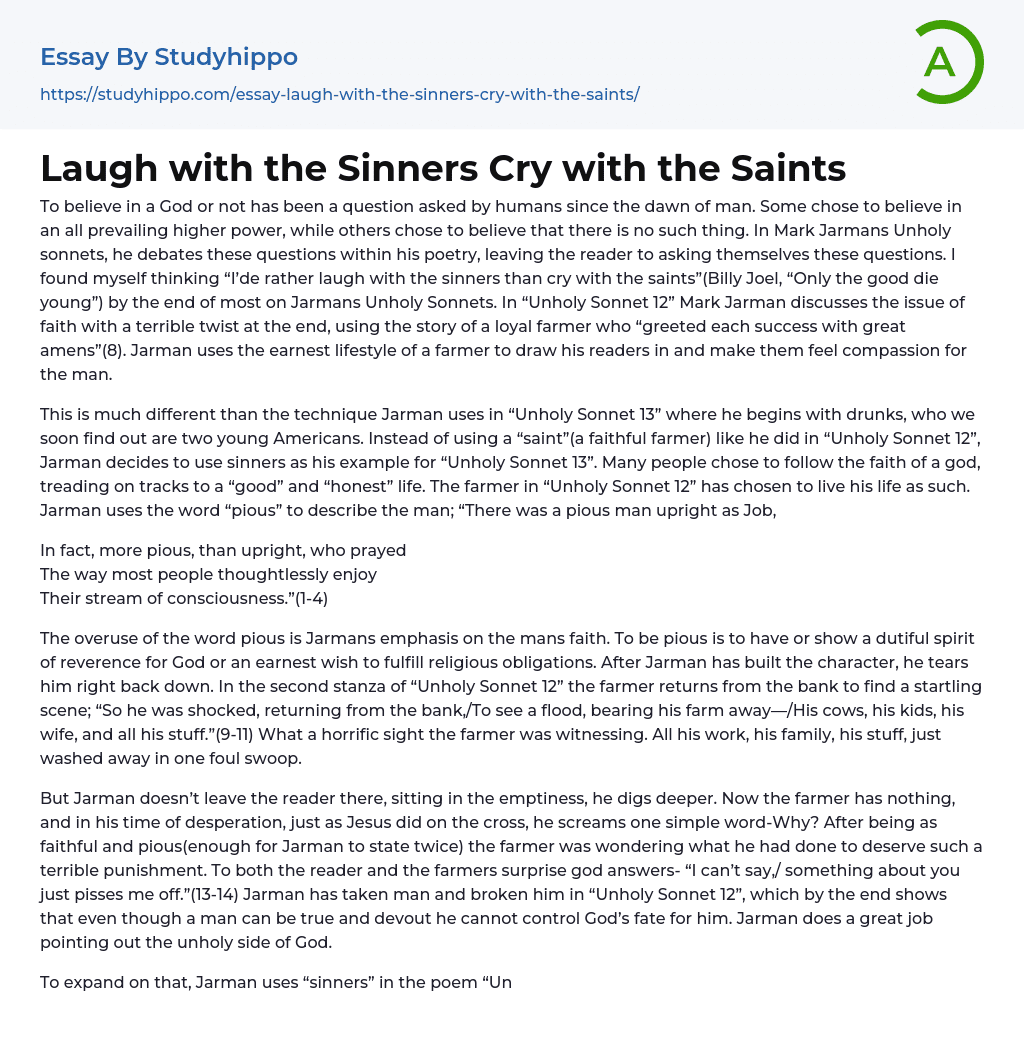The dilemma of embracing the idea of a divine entity has been posed by humanity since its inception. Some people choose to believe in an ultimate power, while others reject this idea completely. These questions are encapsulated in Mark Jarman's "Unholy Sonnets", nudging the reader to ponder over such matters. The well-known line from Billy Joel's song "Only the Good Die Young", "I'd rather laugh with the sinners than cry with the saints," often resonated within me as I delved into Jarman's sonnets. Particularly in "Unholy Sonnet 12", Jarman contemplates faith but throws in an unexpected twist at the end of his poem. He employs a parable about a committed farmer who would respond to each achievement with hearty 'amens' (8) to draw readers in and invoke sympathy for his character.
Jarman's approach in "Unholy Sonnet 13" substantially differs
...from his previous technique. In the 13th sonnet, he begins with two drunken young Americans, noticeably deviating from his earlier use of a "saint" (a dedicated farmer) in "Unholy Sonnet 12". Instead of depicting religious followers, he uses sinners as his core subjects in this sonnet. Many individuals prefer to align themselves with divine faith, pursuing a life guided by righteousness and honesty. The farmer character in "Unholy Sonnet 12" personifies this kind of life, described as "pious" and as upright as Job.
Indeed, being more devout rather than righteous, who worshipped in the manner most individuals heedlessly delight in their continuous flow of thoughts."(1-4)
Jarman often utilizes the word 'pious' to underscore the individual's deep commitment to his religion. The notion of piety connotes a significant reverence for God an
an earnest wish to fulfill religious obligations. However, after constructing this character, Jarman quickly dissects him. In the second stanza of “Unholy Sonnet 12”, an unsettling twist occurs when the farmer returns from a visit to the bank only to witness a horrifying scene; “So he was shocked, returning from the bank,/To see a flood, bearing his farm away—/His cows, his kids, his wife, and all his stuff.”(9-11) The farmer is filled with terror as everything he has strived for - including his family and belongings - gets washed away in one terrifying incident.
Jarman goes beyond leaving the reader to wallow in the despair of the farmer's story. When the situation has worsened, and the farmer is left with nothing, he echoes Jesus's cry on the cross with a heartfelt 'Why?' Despite his faithfulness, which Jarman emphasizes twice, the farmer is left questioning what he did to earn this cruel punishment. Unexpectedly, God responds to both him and the reader, saying: "I can’t say,/ something about you just irritates me."(13-14). In "Unholy Sonnet 12", Jarman pieces together man's agony, exposing that being true and devout can't shield one from God's predetermined destiny. Jarman masterfully exposes God's merciless side.
To further develop the idea, Jarman applies the term "sinners" in his poem "Unholy Sonnet 13". He does this not only to demonstrate that even God can be unholy at times, but primarily, to illustrate how humans are persistently "unholy". In this poem, two lovers are constantly described as "drunk". However, in my view, Jarman is merely employing this term as a means to underscore their infatuation-induced blindness. Contrary to the farmer in "Unholy
Sonnet 12", these lovers do not devote their faith to a God. Instead, they ponder its existence, as reflected in the line - "Who needed God? We had our bodies, bread,
While sipping from glasses filled with a rustic, green, indigenous wine, we silently observed the profound spiritual-less darkness that birthed gigantic, gently shimmering old celestial bodies."(6-9)
The pair in love thought they did not require a deity; they insisted that they possessed everything essential there, especially each other, which mattered the most. Jarman transforms a lovely entity, the stars, emerging from a dimming, vacant sky. As the poem progresses swiftly throughout its 14 lines, it's intriguing to note how Jarman concludes the verse; "Who required God? And what prompts me to question now?
Considering my years, I'm convinced that divine presence is evident in the nuanced specifics which elicit recollections from that time. These elements are as clear today as they were - our physical forms, bread, and the powerful Umbrian wine.
The verse takes an abrupt change, and Jarman reveals by the end that although he felt no need for a deity at that particular moment, reflecting on these occurrences compelled him to accept that God was behind all the minutiae - the wine, the bread, even their bodies. Both "Unholy Sonnet 12" and "Unholy Sonnet 13" inspire contemplation and inquiry in Jarman's readers. They deal with a sensitive matter that many authors typically avoid. The narratives of the destitute yet devout farmer, and of the two lovers swept away by passion, made me ponder: "I'd prefer to find humor with the sinners than to shed tears with
the saints."
- Afterlife essays
- Atheism essays
- Bible essays
- Buddhism essays
- Christian Worldview essays
- Christianity essays
- Confession essays
- Cosmological Argument essays
- Deism essays
- Devil essays
- Existence of God essays
- Faith essays
- Freedom Of Religion essays
- God essays
- Hinduism essays
- Immortality essays
- Islam essays
- Jainism essays
- Jews essays
- Judaism essays
- Miracle essays
- Monk essays
- Monotheism essays
- New Testament essays
- Old Testament essays
- Pilgrimage essays
- Puritans essays
- Revelation essays
- Ritual essays
- Salvation essays
- Sin essays
- Sinners essays
- Soul essays
- Taoism essays
- Temple essays
- Theology essays
- Allegory essays
- Alliteration essays
- Comedy essays
- Comic book essays
- Drama essays
- Dystopia essays
- Fairy Tale essays
- Fantasy essays
- Fiction essays
- Ghost essays
- Gothic Fiction essays
- Gothic Literature essays
- Irony essays
- Legend essays




